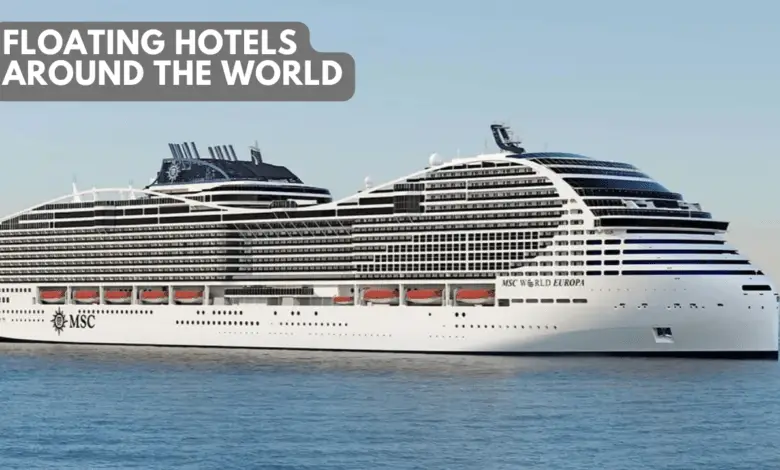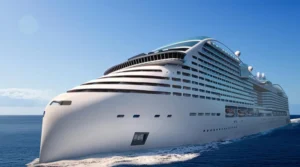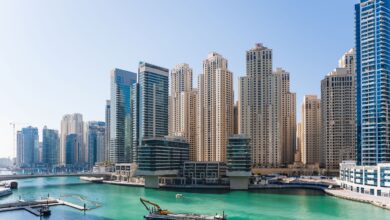🚢 Cruise and Stay: Experiencing Unique Floating Hotels Around the World 🌎
Discover the Ultimate Getaway with Floating Hotels and Cruise Adventures

Introduction
Imagine waking up to the gentle sway of the ocean, with crystal-clear waters stretching as far as the eye can see. You draw back the curtains of your luxurious suite to reveal breathtaking views of marine life just beneath your room.
This isn’t a dream; it’s the reality of staying in a floating hotel. In this blog post, we invite you to embark on a unique journey with us as we explore the world of “Cruise and Stay,” where you not only experience the comfort of a hotel but also the adventure of a cruise. Discover the magic of floating hotels, learn about the incredible destinations they call home, and find out how to plan your own unforgettable cruise and stay experience.
What are Floating Hotels?
Definition and Concept: Floating hotels, often referred to as “floatels,” are innovative accommodations that are built on water bodies such as oceans, rivers, lakes, or even artificial lagoons. These unique establishments offer a novel and immersive experience for travelers who seek a combination of luxury and natural beauty. Floating hotels typically consist of individual rooms or suites that float on the water’s surface, allowing guests to enjoy stunning waterfront views right from their windows.
The concept of floating hotels has evolved to incorporate various amenities, including restaurants, spas, swimming pools, and even conference facilities. These establishments are designed to provide guests with a memorable and tranquil escape, often offering activities like kayaking, paddleboarding, or simply lounging on deck to soak in the serenity of the surrounding water.
Evolution of Floating Hotels: The concept of floating hotels dates back centuries, with early examples like the famous floating palaces on the Nile River in Egypt. However, the modern era has seen a resurgence of interest in floating hotels, driven by advances in engineering, architecture, and sustainability. Iconic examples of contemporary floating hotels include the Manta Resort’s Underwater Room in Zanzibar and the unique Maldives resorts set on stilts above the crystal-clear waters.
One of the most notable developments in the evolution of floating hotels is the construction of fully submerged rooms that provide unparalleled underwater views of marine life. This innovation has pushed the boundaries of luxury and eco-tourism, attracting travelers seeking a deeper connection with the aquatic environment.
Sustainability and Environmental Impact: As floating hotels have gained popularity, there is growing concern about their environmental impact. Sustainable design and operation are becoming crucial considerations in the development of these accommodations. Many floating hotels now employ eco-friendly practices, such as using renewable energy sources like solar power, implementing advanced waste management systems, and supporting local conservation efforts.
Moreover, some floating hotels focus on coral restoration projects, protecting marine ecosystems, and minimizing their carbon footprint. These initiatives help mitigate the potential negative environmental effects of building and operating such structures in sensitive aquatic environments.

Benefits of Choosing a Floating Hotel
Scenic Views and Location: One of the primary benefits of choosing a floating hotel for your getaway is the unparalleled scenic views and idyllic locations they offer. Floating hotels are strategically positioned on water bodies, providing guests with breathtaking vistas of oceans, rivers, lakes, or even vibrant underwater ecosystems. Whether you’re waking up to the sunrise over the sea or enjoying a sunset dinner on the deck, the natural beauty that surrounds these accommodations is sure to leave a lasting impression.
Unique Experiences Onboard: Floating hotels offer a wealth of unique experiences that set them apart from traditional land-based accommodations. Guests can enjoy activities like snorkeling or diving right from their doorstep, embark on boat tours to explore nearby islands or coastal areas, and even indulge in water sports such as kayaking and paddleboarding. Some floating hotels go the extra mile by offering underwater rooms or suites with windows that provide an intimate view of marine life, delivering an unforgettable and one-of-a-kind experience.
Eco-Friendly Features: Many floating hotels prioritize sustainability and eco-friendliness in their design and operations. These accommodations often utilize renewable energy sources, such as solar or wind power, to reduce their carbon footprint. Advanced waste management systems help minimize environmental impact, while support for local conservation initiatives ensures that the surrounding natural beauty remains preserved for future generations. Choosing a floating hotel can allow eco-conscious travelers to enjoy their vacation guilt-free, knowing they are contributing to the protection of the environment.
Privacy and Luxury: Floating hotels excel in providing guests with privacy and luxury. Each room or suite is typically situated in a tranquil and secluded setting, allowing for an intimate and peaceful escape. With a limited number of rooms compared to larger resorts, these accommodations offer a more exclusive experience. Many floating hotels are designed with opulent amenities, including private decks, plunge pools, and spa facilities, ensuring that guests can indulge in ultimate luxury while being surrounded by the soothing sounds of water.
Top Destinations for Cruise and Stay
Maldives: Overwater Bungalows The Maldives is a dream destination for travelers seeking a combination of luxury and natural beauty. Here, you can experience the ultimate in overwater bungalows, where your room is perched above the crystal-clear waters of the Indian Ocean. With direct access to the sea, you can snorkel, swim, or simply bask in the sun from your private deck. The Maldives offers a truly romantic and idyllic cruise and stay experience.
Dubai: The World’s Floating Venice Dubai is known for its extravagance, and a cruise and stay experience here is no exception. Explore the man-made islands and canals of Dubai, often referred to as the “World’s Floating Venice.” Stay in luxurious waterfront hotels, enjoy fine dining on the water, and take in the dazzling views of the city’s skyline. This combination of modern luxury and traditional charm makes Dubai a top destination for cruise and stay enthusiasts.
Thailand: River Cruise Hotels Thailand offers a unique twist on the cruise and stay concept with its river cruise hotels. You can explore the vibrant culture and bustling markets of cities like Bangkok and Chiang Mai before embarking on a serene river cruise along the Chao Phraya or the Mekong River. These river cruises provide a peaceful escape into the heart of Thailand, where you can enjoy picturesque landscapes and immerse yourself in local traditions.
Amsterdam: Houseboats on Canals Amsterdam’s iconic canals are a picturesque backdrop for a cruise and stay experience. Instead of traditional hotels, consider staying on one of the city’s charming houseboats. These floating accommodations offer a unique way to experience Amsterdam’s culture and history. You’ll have easy access to the city’s attractions, museums, and cozy canal-side cafes, all while enjoying the tranquil ambiance of the water.
Canada: Iceberg Viewing in Newfoundland For a cruise and stay adventure that combines natural wonders with maritime heritage, head to Newfoundland, Canada. You can embark on a cruise to witness the awe-inspiring icebergs that float along the Newfoundland and Labrador coast. Afterward, stay in quaint coastal towns and explore the rugged landscapes, historic sites, and vibrant culture of this Canadian province. It’s a truly off-the-beaten-path experience that’s perfect for nature enthusiasts.
Read more about Floating Hotels on Wikipedia!
How to Plan Your Cruise and Stay Experience
Booking Tips and Recommendations:
- Choose Your Destination: Start by deciding on your desired cruise and stay destination. Consider factors such as the type of experiences you want, the climate, and the duration of your trip. Research different cruise itineraries and nearby accommodations to find the best match for your preferences.
- Book in Advance: Cruise and stay experiences can be in high demand, especially during peak travel seasons. To secure the best deals and availability, it’s advisable to book your cruise and accommodations well in advance, typically several months before your planned departure date.
- Bundle Packages: Look for cruise lines or travel agencies that offer bundled packages that include both the cruise and the stay. These packages often provide cost savings and may include additional perks like transportation between the cruise port and your accommodation.
- Research Cruise Lines: Different cruise lines cater to various demographics and travel styles. Research the amenities, activities, and onboard experiences offered by different cruise companies to find one that aligns with your interests and preferences.
- Consider Travel Insurance: It’s a good idea to invest in travel insurance that covers unforeseen events like trip cancellations, medical emergencies, or lost luggage. This can provide peace of mind during your cruise and stay adventure.
Packing Essentials:
- Travel Documents: Ensure you have all necessary travel documents, including passports, visas (if required), cruise tickets, hotel reservations, and any other relevant paperwork.
- Clothing: Pack appropriate clothing for both the cruise and stay portions of your trip. Include swimwear, formal attire (for cruise dinners), comfortable walking shoes, and clothing suitable for the climate of your destination.
- Toiletries: Bring your toiletries, including sunscreen, insect repellent, and any medications you may need. Cruise cabins often provide basic amenities, but it’s a good idea to have your preferred products on hand.
- Electronics: Don’t forget your chargers, adapters, and any electronic devices you plan to use during your trip. Consider a waterproof phone case for water-based activities.
- Travel Accessories: Pack essentials like a travel-sized first aid kit, a reusable water bottle, a power bank, and a travel guide or maps of your destination.
Budget Considerations:
- Set a Budget: Determine your overall budget for the cruise and stay experience, including the cost of the cruise, accommodation, meals, activities, and any additional expenses. Having a clear budget will help you make informed decisions and avoid overspending.
- Hidden Costs: Be aware of potential hidden costs such as gratuities, excursions, alcoholic beverages, and specialty dining on the cruise. It’s a good idea to research these costs in advance and budget for them accordingly.
- Currency Exchange: If your cruise and stay destination uses a different currency, plan for currency exchange fees and fluctuations in exchange rates. Consider using a travel card or prepaid currency card to manage your expenses.
- Book Early for Deals: Booking your cruise and accommodations well in advance can often lead to cost savings. Keep an eye out for promotions, discounts, and package deals that may offer better value for your money.
- Emergency Fund: Set aside a portion of your budget as an emergency fund for unexpected expenses or emergencies during your trip. Having this safety net can provide peace of mind while traveling.
Floating Hotel Trends
Underwater Suites:
One of the most intriguing trends in floating hotels is the rise of underwater suites. These innovative accommodations allow guests to sleep beneath the water’s surface, offering breathtaking views of marine life and underwater ecosystems. Resorts like the Conrad Maldives Rangali Island and the Manta Resort in Zanzibar have pioneered this concept, featuring rooms with large glass windows that provide an immersive underwater experience. This trend not only appeals to luxury travelers seeking unique experiences but also contributes to marine conservation efforts by fostering appreciation for the world’s oceans.
Floating Villages:
Floating villages have emerged as a captivating trend in the world of floating hotels. These self-contained communities of floating accommodations offer a harmonious blend of sustainability and cultural immersion. Destinations like Cambodia’s Tonle Sap Lake and Thailand’s floating markets feature floating villages where visitors can stay in traditional stilted houses or floating huts. These experiences provide an authentic connection with local communities and offer travelers a chance to witness a way of life deeply rooted in the water.
Sustainable Initiatives:
Sustainability is at the forefront of floating hotel trends, reflecting the growing concern for environmental conservation. Many floating hotels are adopting eco-friendly practices to minimize their impact on fragile aquatic ecosystems. This includes using renewable energy sources like solar and wind power, implementing efficient waste management systems, and employing local sourcing for food and materials.
Some floating hotels are even engaged in coral reef restoration efforts, showcasing a commitment to preserving the underwater environments they inhabit. This focus on sustainability not only benefits the environment but also attracts eco-conscious travelers seeking responsible and memorable getaways.
Frequently Asked Questions
Q: How do I book a stay at a floating hotel?
A: Booking a floating hotel is similar to booking a regular hotel. You can visit the hotel’s website or use a trusted travel booking platform to make your reservation.
Q: Are floating hotels safe during storms?
A: Yes, floating hotels are designed to withstand various weather conditions, including storms. They are equipped with advanced stabilizing technology to ensure a comfortable and safe stay for guests.
Q: What activities can I enjoy at a floating hotel?
A: Floating hotels offer a wide range of activities, from water sports like snorkeling and kayaking to spa treatments, fine dining, and cultural experiences.
Q: Are floating hotels eco-friendly?
A: Many floating hotels prioritize sustainability and eco-friendliness. They often use eco-friendly materials, employ responsible waste management practices, and support local conservation efforts.
Q: Can I bring children to a floating hotel?
A: Yes, many floating hotels are family-friendly and offer amenities and activities suitable for children of all ages. However, it’s advisable to check with the hotel in advance regarding their policies on children.
Q: What’s the best time to visit a floating hotel?
A: The best time to visit a floating hotel depends on your chosen destination. Research the climate and weather conditions of the region to plan your trip accordingly.
Conclusion
In a world filled with conventional travel experiences, the allure of floating hotels stands out as a beacon of uniqueness and luxury. From overwater bungalows in the Maldives to icebergs in Canada, these remarkable accommodations offer a chance to live on the water, surrounded by beauty and tranquility.
As you plan your next vacation, consider adding a “Cruise and Stay” adventure to your bucket list. Whether you’re a nature enthusiast, a luxury seeker, or an eco-conscious traveler, there’s a floating hotel waiting to exceed your expectations. But remember, as you embrace these unique experiences, let’s also embrace our responsibility towards the environment and practice sustainable tourism.
So, pack your bags, set sail, and immerse yourself in the world of floating hotels, where the horizon is your neighbor, and the sea is your sanctuary. It’s time to make memories that will last a lifetime on these extraordinary floating wonders. Bon voyage!
Up Next
🌿 Eco-Friendly Escapes: Sustainable Hotels in 🇨🇷 Costa Rica’s 🌧️ Rainforests 🌴





Facebook Comments